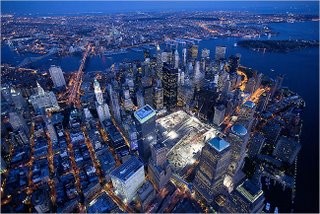Sept 11

I was in Paris on Sept 11, 2001. I was to leave for New York on Sept 12th. We came back to our hotel room and turned the TV on, and saw replays of the planes crashing into the towers. The broadcasts were all in French. No planes were allowed to leave for America for a week after. So we were stuck in a mid way point. We went downstairs to eat at a Moroccan kabab place and all the men were standing around the TV looking shocked. It was strange being somewhere else and not being able to get back.
Here is an interesting take on the three 9.11's by P. Sainath.
Three 9/11s — choose your own
P. Sainath
There were three 9/11s in history. The New York one of 2001. The neo-liberal one of Chile 1973, and the non-violent one of 1906 — Gandhiji's satyagraha in South Africa. The authors of all three tried to change the world. Two brought bloodshed, destruction, misery, and chaos. But the Mahatma's WMD — Weapon of Mass Disobedience — helped change the world for the better.
FIVE YEARS on, the world is a more dangerous place than it was prior to September 11, 2001. Acts of terror, real and presumed, cause panic each month across the globe. Hundreds of people have been killed in terror attacks in many countries. Tens of thousands have been slaughtered in wars in Iraq and Afghanistan alone. Both nations have been ravaged and devastated. Millions of lives have been disrupted forever. Lebanon lies shattered. And more and more flashpoints — even nuclear ones — emerge. In a divided planet, there is one zone of agreement: the worst is yet to come.
The appalling crime committed in New York on 9/11 — when close to 3,000 people were murdered in the WTC bombing — is still fresh in memory. One claim of the time was that it had "changed the world forever." Did it? And in what ways? The West's search for security against a global threat continues. It was there in the 1960s too, when the satirical song writer Tom Lehrer sang an ode to it in his "MLF Lullaby." The `multilateral force' set up to `deter' the Russian threat was its subject. "MLF, will scare Brezhnev," crooned Lehrer, "I hope he is half as scared as I."
.................................
Non-violent 9/11
The first of the 9/11s did help change the world. That was the day Gandhiji's Satyagraha in South Africa first began — September 11, 1906. Today is the 100th anniversary of that launch of his non-violent resistance movement. Gandhiji was quite clear it was a war he was fighting against racism and colonial oppression in South Africa. A war he saw as touching anti-colonial sentiment in India as well. A war he felt he had a strategy for. "Only the general who conducts a campaign can know the objective of each particular move," he later wrote. "And as this was the first attempt to apply the principle of satyagraha to politics on a large scale, it is necessary any day that the public should have an idea of its development."
For decades, the weapon of mass disobedience he had developed rattled the British in India. Gandhiji always referred to 9/11, 1906, as the day it all began. "The term satyagraha was invented and employed in connection therewith," he wrote. And listed the times where he used it again — in India. It was to be used yet again in South Africa much later. It was also used by Martin Luther King in the civil rights struggle in the United States.

Comments